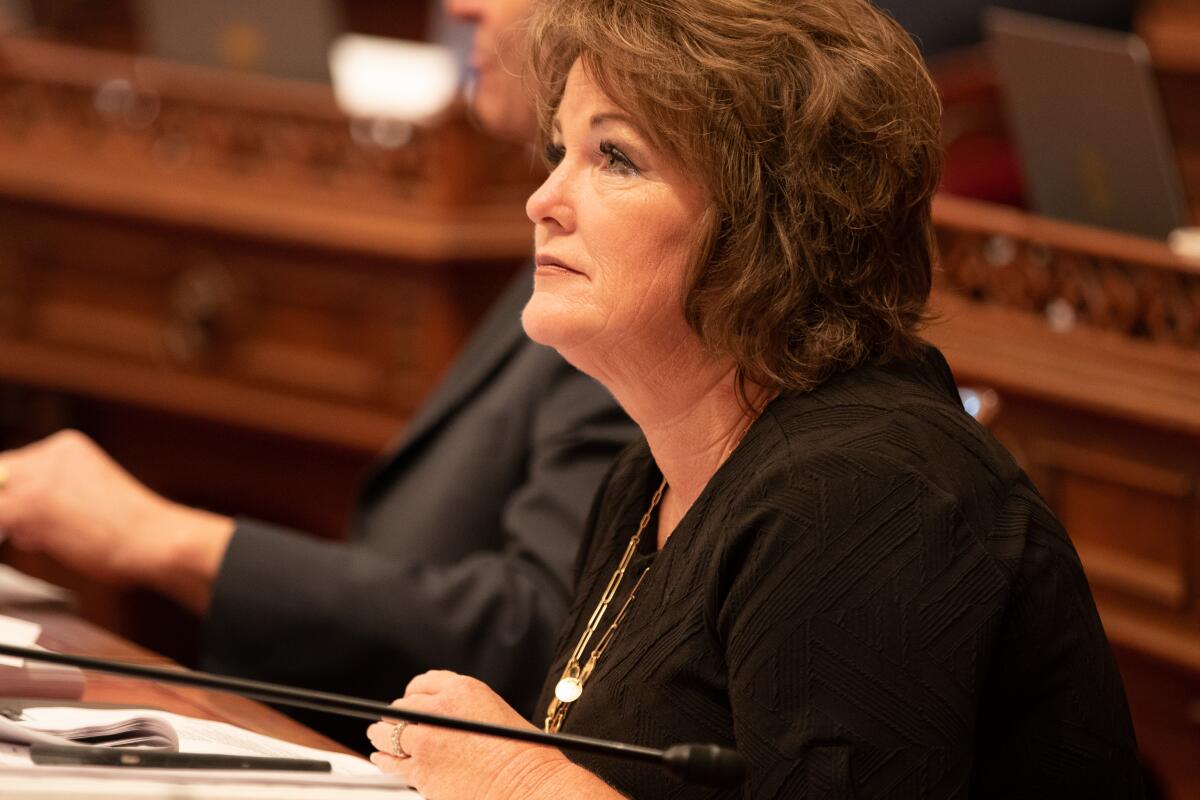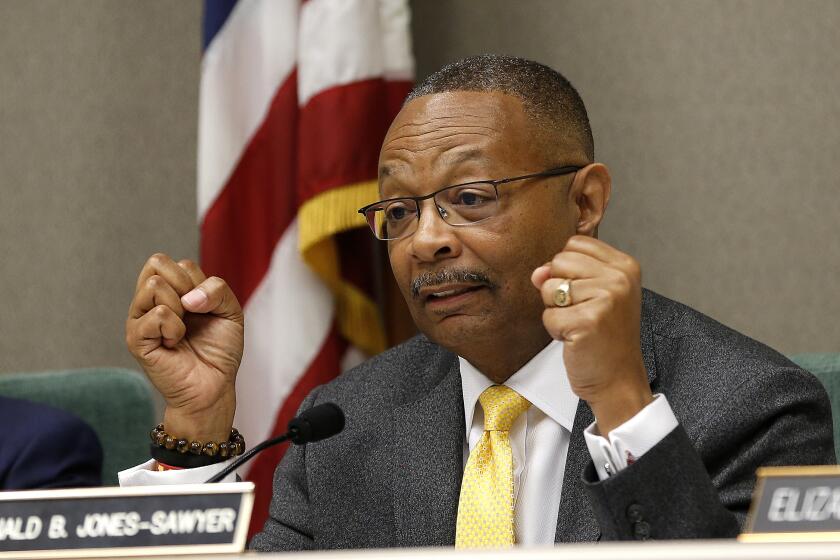California Democrats reverse course after killing bill to stiffen penalties for child sex trafficking

- Share via
After rejecting a proposal to stiffen penalties for repeat sex trafficking of minors, a decision that triggered bipartisan outrage in the state Capitol, California Democrats on a high-profile policy committee backpedaled on Thursday.
Senate Bill 14, which would add human trafficking of a minor for sex to the list of “serious felonies” under California’s penal code, was sailing through the Legislature with bipartisan support all year until Democrats on the Assembly Public Safety Committee struck it down Tuesday amid concerns that it would penalize victims and worsen incarceration rates.
Chaos erupted in the Democratic-controlled Legislature after the committee’s vote, with Republican lawmakers blaming Democrats for failing to crack down on child sex trafficking and Democrats blaming Republicans for failing to address the root causes of crime.
“We’re talking about children being raped everyday,” the bill’s author, state Sen. Shannon Grove (R-Bakersfield) said in a Wednesday interview with The Times. “It’s just very, very, very disturbing.”
Both Gov. Gavin Newsom and Assembly Speaker Robert Rivas (D-Hollister) intervened with promises to continue working on the proposal. Newsom said on Wednesday that he called Grove personally about the bill and claimed that he was “surprised” by its demise, while Rivas, who is less than two weeks into his leadership role, said it was “something that we are addressing and it’s something we are going to get right.”
Tensions reached a boiling point Thursday when Republicans unsuccessfully tried forcing a vote on the human trafficking legislation in the full Assembly, an effort Democrats thwarted. Instead, the bill was pulled back to the Public Safety Committee, where it passed 6-0 without any debate. Several Democrats who had initially abstained from voting on SB 14 reversed course and voted in its favor, including the committee’s chair, Assemblymember Reggie Jones-Sawyer (D-Los Angeles).
“This is a bill with strong bipartisan support, and protecting victims of child sex trafficking should not be a partisan issue. Today is a victory for every survivor,” Grove said in a statement after the vote.
Current law can send convicted human traffickers of minors to prison for up to 12 years, or 15 years to life if the crime involves, among other factors, force, coercion or violence. But by making the crime a “serious” felony subject to California’s “three strikes” law, SB 14 aims to lengthen prison terms for repeat traffickers and ensure they’re not released early. A relic of California’s “tough on crime” era of the 1980s and 90s, three strikes allows prosecutors to pursue life sentences for individuals who commit a third crime and have two prior convictions of “serious” or “violent” felonies on their records.
Grove has long argued that repeat sex traffickers are not held accountable in California. She was finally making progress on her efforts this year with SB 14, which she narrowed in scope to appease the more left-leaning members of the Senate who traditionally oppose measures to increase the prison population. The Senate passed the legislation with a 40-0 vote in May, sending it to the Assembly.
The Assembly Public Safety Committee initially voted SB 14 down amid concerns that it could unintentionally lead to the prosecution of victims who are forced into a cycle of human trafficking, while exacerbating racial inequities in California’s prison system.
The controversial panel of mostly Democratic members regularly strikes down proposals that they think could usher in a new wave of mass incarceration, instead preferring legislation that promotes rehabilitation and alternatives to prison and using existing options to hold criminals accountable. Earlier this year, Jones-Sawyer sparked outrage when he shelved several bills to strengthen punishment of repeat fentanyl dealers, a decision he later walked back.
Saying they want to decrease California’s prison population, lawmakers kill bills to increase criminal penalties for fentanyl dealers.
“At the end of the day, what we want is to protect these women,” Jones-Sawyer said before the committee rejected SB 14. “And our children, most importantly, we want them to be protected. So what is going on out there in the world that these minors, women...are not being protected with existing laws?”
The committee’s course reversal frustrated the bill’s opponents, who have rejected the argument that sex traffickers are not being punished in California.
Isa Borgeson, a manager for the Ella Baker Center for Human Rights, an advocacy organization opposed to SB 14, said the measure “does nothing to prevent the trafficking of minors or provide them with the healing that they need and deserve.”
“The people most vulnerable to being charged with trafficking are the victims of trafficking themselves. Charges are used to leverage their cooperation in prosecution and their survivor status is erased with many currently incarcerated in both youth and adult prisons,” Assembymember Isaac Bryan (D-Los Angeles), a close Rivas ally, wrote on Twitter. Bryan is a member of the Public Safety Committee, and abstained from voting on SB 14 both on Tuesday and Thursday.
“Nobody supports the trafficking of children or any people. That’s why existing laws carry the potential for life in prison. We can and must do more to affirm, protect, and support survivors with all of our civic resources — including those beyond the criminal legal system,” he wrote.
Those concerns will likely remain for the rest of this year’s legislative session, and could tank the bill again if Grove doesn’t take more amendments to reduce some of the bill’s penalties or add in language that would ensure victims aren’t punished for their traffickers’ crimes.
In a statement, Assemblymember Rick Chavez Zbur (D-Los Angeles) said he voted for the bill Thursday to give Grove more time to change it to address the opposition and ensure it would not lead to the prosecution of victims. Zbur initially abstained from voting on SB 14.
“The bill still needs more work before it comes back to the floor to ensure that a victim is treated like a victim — not a criminal — and the real perpetrators are brought to justice,” Zbur said.
Senate Bill 14 is expected to be heard in Assembly Appropriations, a key fiscal committee, once lawmakers return from a month-long recess in mid-August. The final day to pass bills this year is Sept. 14.
More to Read
Sign up for Essential California
The most important California stories and recommendations in your inbox every morning.
You may occasionally receive promotional content from the Los Angeles Times.















